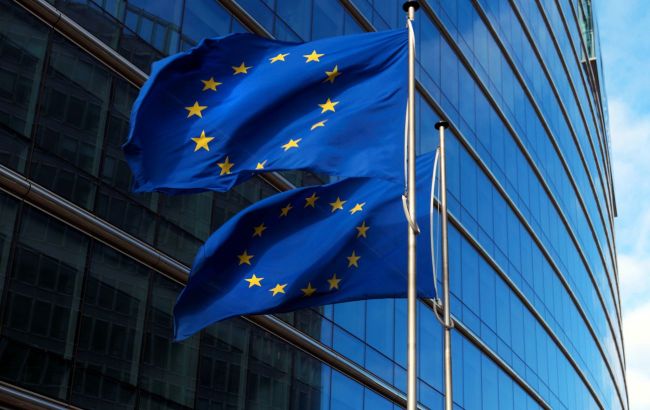EU could stop financial support to Ukraine over NABU, SAPO issues — Media
 The EU is deeply dissatisfied with the restriction of NABU and SAPO's powers (Photo: Getty Images)
The EU is deeply dissatisfied with the restriction of NABU and SAPO's powers (Photo: Getty Images)
The European Commission has threatened Ukraine with a complete suspension of financial aid due to the law restricting the powers of NABU and SAPO and subordinating their activities to the Prosecutor General, according to Frankfurter Allgemeine Zeitung (F.A.Z.).
Sources cited by F.A.Z. report that Ukraine’s leadership, headed by President Volodymyr Zelenskyy, received a signal from the European Commission that funding from the European Ukraine Facility may be fully halted if pressure on key anti-corruption institutions continues.
According to a well-informed source in Kyiv, the Ukrainian government has received the corresponding letter.
Overall, the Ukraine Facility program provides for allocating up to €50 billion to Ukraine by 2027. Most of these funds go directly to the state budget.
Opposition MP and former Minister for European Integration Ivanna Klympush-Tsintsadze confirmed that the EU indeed sent such a notification.
According to her, the message stated that financial aid under the EU Facility will be frozen if the situation with the anti-corruption agencies is not corrected. Moreover, this refers to freezing all upcoming financial tranches, not just part of the planned disbursements.
Strong report from the European Commission
Frankfurter Allgemeine Zeitung (F.A.Z.) noted that European Commission experts have prepared a detailed report analyzing the events surrounding NABU and SAPO, which was submitted to the embassies of EU countries in Kyiv as well as to the Commission itself.
The document describes the searches and arrests at NABU as the gravest attempt to interfere with the functioning of Ukraine’s anti-corruption system since its establishment.
According to the authors, this reflects an institutional conflict in which the ruling elite demonstrates its ability to restrict autonomous anti-corruption bodies. Such actions are seen as a response to investigations that affect the interests of political and economic elites.
Chernyshov factor
The report calls the official justification for the actions, namely, fighting Russian agents within NABU, unconvincing.
Instead, the authors of the document describe the investigation against former Deputy Prime Minister Oleksiy Chernyshov as the institutional trigger for the operation. Chernyshov, a friend of President Zelenskyy, is accused by NABU of receiving benefits in exchange for issuing construction permits, though he denies the allegations.
The report also states that the primary target of the July 21 operation was NABU officer Oleksandr Skomarov, who was handling the case against Chernyshov. Searches were conducted in his department, and documents were seized. As a result, Skomarov’s unit’s work was destabilized.
Evidence seized from NABU may now be rejected by courts due to violations of confidentiality and legality in collecting information.
“This could effectively lead to the closure of the case against the Deputy Prime Minister,” the European Commission’s report states.
Shift in priorities and risks to reform
According to EU experts, the recent operation signals a shift in Ukraine’s priorities - from accountability to effectiveness.
“Political expediency is increasingly outweighing legal stability. Such actions call into question Ukraine’s achievements in anti-corruption reform,” the report states.
Experts note that the July 21 operation undermines international partners’ trust in Ukrainian institutions and strikes at the foundations of the anti-corruption system. In their view, it poses a serious challenge to the rule of law and the principle of separation of powers.
“This case sets a precedent showing that any anti-corruption body in Ukraine can be ‘neutralized,’” the European Commission document says.
The European Commission press service officially told F.A.Z. that the EU is deeply concerned about legislative changes in Ukraine, which pose a serious threat to the powers and capacities of anti-corruption institutions.
NABU and SAPO are called cornerstones of the rule of law in Ukraine and must be able to operate independently.
Controversial law on NABU and SAPO
On July 22, the Verkhovna Rada approved a law that limited the powers of NABU and SAPO.
On the same day, the Security Service of Ukraine (SBU) and other special agencies conducted searches in 70 NABU units and detained several investigators over suspected cooperation with Russia.
Also that day, the parliamentary majority urgently passed a law subordinating NABU and SAPO to the Prosecutor General, who is appointed by the president.
These events sparked public outcry — protests took place in many cities across Ukraine. President Zelenskyy and his party were accused of trying to monopolize and usurp power.
EU Commissioner for Enlargement, Martha Kos, called the law’s adoption a serious step backward. Meanwhile, the ambassadors of the Group of Seven (G7) expressed concern over the legislation.
Before this, NABU had initiated anti-corruption investigations against several individuals close to Zelenskyy, including Oleksii Chernyshov, who served as Deputy Prime Minister until mid-July. Never before had Ukraine investigated a case against a government official of such high rank.
Suspension of EU funding
On July 24, President Zelenskyy urgently submitted to the Verkhovna Rada a draft law on the independence of NABU and SAPO and preventing Russian influence on anti-corruption bodies. The vote on this bill is scheduled for Thursday, July 31.
The next day, a spokesperson for the European Commission announced that the disbursement of €1.5 billion in financial aid to Ukraine had been temporarily suspended.
Additionally, the EU has significantly reduced the amount of the next tranche of aid to Ukraine.

